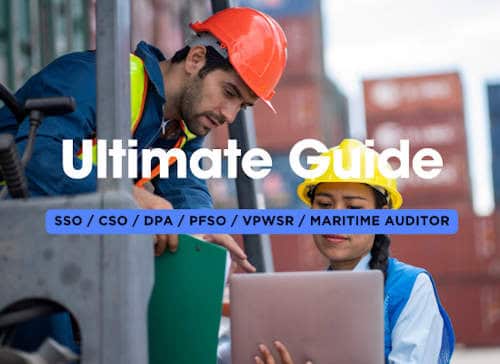Ultimate Guide to SSO, CSO, DPA, PFSO, VPWSR, and Maritime Auditor Training and Careers

In today’s maritime industry, security and compliance have never been more important. From ensuring the safety of vessels and port facilities to adhering to strict international regulations, specialized training programs equip maritime professionals with the skills needed to manage and maintain security. Roles such as Ship Security Officer (SSO), Company Security Officer (CSO), Designated Person Ashore (DPA), and Port Facility Security Officer (PFSO) each come with unique responsibilities that require rigorous training and certification. Additionally, crew members with specific security duties (VPWSR/PDSD) and Maritime Auditors are integral in maintaining global maritime standards. This article dives into these essential maritime security roles, offering a comprehensive overview of the training programs, career paths, and real-world challenges that come with them.
SSO / CSO / DPA / PFSO / VPWSR / Maritime Auditor

Ship Security Officer (SSO) Training
The role of a Ship Security Officer (SSO) is vital for ensuring the security of vessels while at sea and in port. An SSO is responsible for implementing and maintaining the ship’s security plan, handling security incidents, and ensuring that the crew follows security protocols. With rising security threats and evolving regulations, the demand for SSOs is increasing, making this a valuable career path for those in the maritime industry. Below is an in-depth look at what's involved in becoming an SSO, including salary, demand, and certification requirements.
| ShipUniverse: Ship Security Officer (SSO) Training Overview | ||
|---|---|---|
| Category | Description | Additional Details |
| Required Experience | Most SSOs have maritime experience as officers or crew members. Knowledge of ship operations, safety, and security protocols is essential. | Typical candidates include Deck Officers, Chief Officers, or those with experience in maritime security. |
| Certification Process | SSO certification involves a 15-30 hour course covering security risk assessments, ship security plan implementation, and threat response. Candidates must pass practical and theoretical exams. | Certificates are internationally recognized and comply with ISPS Code standards. Certification is valid internationally and often requires periodic refresher courses. |
| Key Course Topics | SSO training includes modules on ship security assessments, creating and maintaining security plans, conducting security inspections, and responding to security incidents. | Courses also focus on communication with Port Facility Security Officers (PFSOs) and Company Security Officers (CSOs), as well as crisis management drills. |
| Job Demand | There is high demand for SSOs globally due to increased security threats, particularly on cargo ships, cruise liners, and tankers. | Demand is rising due to compliance with ISPS regulations, piracy risks, and the need for improved onboard security protocols. |
| Average Salary | SSOs earn between $50,000 and $80,000 annually, with potential for higher salaries on international routes and specialized ships like LNG or oil tankers. | Salaries vary by ship size, company, and level of experience. Senior SSOs or those with additional responsibilities may earn over $90,000. |
| Opportunities for Advancement | SSOs can progress to more senior positions, such as Company Security Officer (CSO) or Designated Person Ashore (DPA), with additional training and experience. | Further certifications, such as CSO training, can enhance career prospects. CSOs oversee security for entire fleets rather than individual vessels. |
| Real-World Challenges | SSOs often deal with piracy threats, stowaways, unauthorized access, and ensuring compliance with security protocols in port and at sea. | Quick decision-making, effective communication, and strong leadership are required to manage emergencies and security breaches. |
| Work Environment | SSOs work onboard ships, managing day-to-day security tasks. They also liaise with port officials and ensure compliance with international security standards. | Work contracts typically last 6-9 months at sea. The job can be physically demanding and requires the ability to handle stressful situations. |
| Physical & Mental Requirements | Good physical health is essential, as SSOs need to patrol ships and respond to physical threats. Mental resilience is needed to manage high-pressure security situations. | SSOs must be able to lead a crew in emergency situations, maintain security protocols, and work effectively with international port authorities. |
Company Security Officer (CSO) Training
The role of a Company Security Officer (CSO) is to oversee the security of a company's entire fleet and ensure compliance with international maritime security regulations, such as the ISPS Code. A CSO is responsible for developing and maintaining security plans for multiple vessels, coordinating with Ship Security Officers (SSOs), and handling security threats at a company-wide level. This training prepares maritime professionals for a critical leadership role that involves both operational and strategic security management. Below is an in-depth look at the CSO training, including salary, demand, and certification requirements.
| ShipUniverse: Company Security Officer (CSO) Training Overview | ||
|---|---|---|
| Category | Description | Additional Details |
| Required Experience | CSOs typically have significant maritime experience, often progressing from roles such as Ship Security Officer (SSO) or Deck Officer. Understanding of maritime operations and security protocols is essential. | Most CSOs have 5+ years of experience in maritime security or operational roles. Experience working with multiple vessels is highly valued. |
| Certification Process | CSO certification involves specialized training in fleet security management, risk assessment, and security plan development. Courses generally last 15-30 hours. | Training typically includes both theoretical and practical components, focusing on managing security across multiple vessels and handling company-wide security responsibilities. |
| Key Course Topics | Topics include company-wide security management, developing and maintaining security plans for multiple vessels, threat assessment, and emergency response coordination. | CSOs also learn how to liaise with Ship Security Officers (SSOs), Port Facility Security Officers (PFSOs), and international port authorities. |
| Job Demand | The demand for CSOs is high, particularly in large shipping companies with fleets that operate in high-risk areas. Compliance with the ISPS Code is a driving factor in the need for qualified CSOs. | There is strong demand in sectors like oil and gas tankers, cruise lines, and large cargo fleets. Companies prefer experienced candidates with a track record in fleet security. |
| Average Salary | The average salary for a CSO ranges from $80,000 to $120,000 annually, depending on the size of the company and the fleet. Large international companies typically offer higher compensation. | Salaries may increase significantly for CSOs managing larger fleets or for those working in high-risk areas such as the Gulf of Aden or West Africa. |
| Opportunities for Advancement | CSOs can advance into senior security management roles or even executive positions within the company. Additional certifications such as Designated Person Ashore (DPA) can further enhance career prospects. | With enough experience, CSOs may also transition into consulting roles, advising companies on maritime security best practices and regulatory compliance. |
| Real-World Challenges | CSOs handle company-wide security issues, including managing multiple vessels in various global locations. They coordinate responses to piracy threats, stowaways, and security breaches. | CSOs need strong leadership skills to manage security teams across different vessels and the ability to create and implement effective security plans under tight deadlines. |
| Work Environment | CSOs work primarily from the company's head office, overseeing the security of multiple vessels. They are in constant communication with Ship Security Officers (SSOs) and port authorities. | Travel to inspect ships and ensure compliance with security regulations may be required. CSOs are often called upon during emergencies to coordinate a company-wide response. |
| Physical & Mental Requirements | Strong mental resilience and problem-solving skills are essential, as CSOs must handle complex security challenges involving multiple vessels. Physical requirements are less demanding than onboard roles but may include travel and ship inspections. | CSOs must have excellent communication skills to manage and coordinate with diverse security teams and maintain relationships with international port authorities and shipping clients. |
Designated Person Ashore (DPA) Training
The role of a Designated Person Ashore (DPA) is crucial for ensuring the safety and compliance of a shipping company’s operations. DPAs act as a bridge between the crew on ships and the company’s management onshore. They oversee the implementation of safety management systems (SMS) in accordance with the International Safety Management (ISM) Code. The DPA is responsible for ensuring that all vessels in the fleet comply with safety and environmental regulations and that there is proper communication between ship and shore. Below is an in-depth look at the DPA role, including salary, demand, and training certification requirements.
| ShipUniverse: Designated Person Ashore (DPA) Training Overview | ||
|---|---|---|
| Category | Description | Additional Details |
| Required Experience | DPAs usually have extensive maritime experience, often progressing from senior onboard roles such as Captain or Chief Engineer. A thorough understanding of the ISM Code and maritime safety regulations is essential. | Experience in both onboard operations and shore-based management roles is highly valued. DPAs typically have at least 5-10 years in the maritime industry. |
| Certification Process | DPA certification involves training in safety management systems, risk management, and regulatory compliance. The course typically lasts 15-30 hours and includes both theoretical and practical components. | The training covers the ISM Code, communication between ship and shore, and the DPA’s role in emergency response. Online and in-person options are available. |
| Key Course Topics | Training includes in-depth knowledge of safety management systems (SMS), ISM Code compliance, risk assessment, and incident investigation. Communication protocols between ship and shore are also covered. | Focus is placed on the DPA’s role in ensuring environmental compliance, handling crew safety issues, and managing crisis situations such as accidents or equipment failure. |
| Job Demand | The demand for DPAs is steady due to the critical nature of their role in ensuring compliance with international safety regulations. Every shipping company is required to have a DPA to meet ISM Code requirements. | DPAs are especially in demand in large shipping companies that manage fleets of multiple vessels. The position is essential for maintaining safety and operational standards in international shipping. |
| Average Salary | DPAs typically earn between $90,000 and $140,000 annually, depending on the size of the company and the number of vessels they oversee. | Salaries may increase for DPAs working in high-risk areas or managing fleets for international companies. Senior DPAs with significant experience can earn even higher salaries. |
| Opportunities for Advancement | DPAs can advance to senior management positions within shipping companies, such as Director of Operations or Chief Safety Officer. Consulting roles in safety management are also a potential career path. | Additional certifications in safety and environmental management can further enhance career prospects. DPAs with extensive experience are often sought after for industry consulting roles. |
| Real-World Challenges | DPAs face the challenge of managing safety and compliance for multiple vessels, ensuring that safety management systems are followed both onboard and ashore. Emergency situations, such as accidents or environmental incidents, require immediate action and coordination. | The role requires strong leadership, decision-making, and communication skills. DPAs must remain calm under pressure and coordinate effectively with both crew and management during crises. |
| Work Environment | DPAs work primarily in a shore-based office, overseeing fleet operations and ensuring compliance with safety management systems. They maintain communication with the crew onboard and respond to safety and compliance issues as needed. | Regular travel to vessels for inspections and audits is required. DPAs must be available for emergencies and be able to coordinate safety measures remotely if necessary. |
| Physical & Mental Requirements | While the physical demands of the role are minimal, DPAs need strong mental resilience and excellent problem-solving skills. They must handle stress effectively and make quick decisions in high-pressure situations. | Excellent communication skills are essential to maintain effective contact between ship and shore, as well as to ensure that the safety management system is consistently followed across the fleet. |
Port Facility Security Officer (PFSO) Training
A Port Facility Security Officer (PFSO) plays a vital role in ensuring the security of port facilities in compliance with the International Ship and Port Facility Security (ISPS) Code. PFSOs are responsible for assessing security risks, developing and implementing security plans, and coordinating with Ship Security Officers (SSOs) and other authorities to ensure that the port facility is secure. Their role is critical in protecting ports from threats such as terrorism, smuggling, and piracy. Below is an in-depth look at the PFSO role, including training requirements, salary expectations, and job demand.
| ShipUniverse: Port Facility Security Officer (PFSO) Training Overview | ||
|---|---|---|
| Category | Description | Additional Details |
| Required Experience | PFSOs generally have experience in security, law enforcement, or maritime operations. Knowledge of the ISPS Code and port operations is essential. | Previous experience in port security or logistics management is highly valued. PFSOs often transition from other maritime security roles, such as Ship Security Officer (SSO) or law enforcement agencies. |
| Certification Process | PFSO certification requires a 15-30 hour course that covers security risk assessments, port security plans, threat identification, and emergency response coordination. | The certification includes both theoretical and practical training, focusing on compliance with the ISPS Code. Training is often completed at accredited maritime security institutions or through online programs. |
| Key Course Topics | PFSO training focuses on security assessments, the development and implementation of port security plans, coordinating with law enforcement, and conducting security inspections. | Additional topics include crisis management, emergency response coordination, and the prevention of illegal activities such as smuggling and unauthorized access. |
| Job Demand | The demand for PFSOs is high, particularly in major ports that handle large volumes of cargo or serve as critical points in international shipping routes. Compliance with the ISPS Code has made this role mandatory for all port facilities. | Demand is especially strong in regions with high cargo traffic and security risks, such as major ports in Europe, Asia, and the United States. |
| Average Salary | The average salary for a PFSO ranges from $70,000 to $100,000 annually, depending on the size and location of the port. | Larger, high-traffic ports may offer higher salaries, while smaller regional ports typically offer lower compensation. Experience in security management or law enforcement can increase earning potential. |
| Opportunities for Advancement | PFSOs can advance into senior security management roles, overseeing multiple port facilities or transitioning into security consulting positions for maritime companies or government agencies. | Further certifications in advanced port security, counterterrorism, or international logistics can enhance career prospects and open opportunities for global consulting roles. |
| Real-World Challenges | PFSOs must handle complex security challenges, such as preventing unauthorized access, managing security incidents, and ensuring compliance with international regulations. They are also responsible for coordinating with local and international law enforcement agencies. | The role requires quick decision-making in response to real-time threats and efficient communication with security personnel, port operators, and law enforcement. |
| Work Environment | PFSOs work primarily at port facilities, managing the security infrastructure and monitoring daily operations. They are responsible for conducting security drills and ensuring that all personnel follow established security protocols. | The role can involve long hours, particularly when responding to security threats or during busy port operations. Regular interaction with government agencies and maritime authorities is required. |
| Physical & Mental Requirements | Strong mental focus and resilience are required to manage security threats and ensure compliance with security protocols. Physical fitness is beneficial for conducting security inspections and patrolling port facilities. | PFSOs must also possess excellent communication and leadership skills to effectively manage security personnel and coordinate with port authorities during crises. |
Vessel Personnel with Designated Security Responsibilities (VPWSR/PDSD) Training
Vessel Personnel with Designated Security Responsibilities (VPWSR) or Proficiency in Designated Security Duties (PDSD) training is designed for crew members who have specific security-related duties onboard a vessel. These individuals assist in implementing the ship's security plan, monitoring restricted areas, and responding to security threats. VPWSR/PDSD training ensures that these crew members are prepared to handle security responsibilities in compliance with the International Ship and Port Facility Security (ISPS) Code. Below is an in-depth look at the role, training requirements, and career prospects for individuals pursuing VPWSR/PDSD certification.
| ShipUniverse: Vessel Personnel with Designated Security Responsibilities (VPWSR/PDSD) Training Overview | ||
|---|---|---|
| Category | Description | Additional Details |
| Required Experience | VPWSR/PDSD training is suitable for vessel personnel with specific security duties. Prior maritime experience is preferred, but no advanced qualifications are necessary. | Candidates are typically crew members responsible for security monitoring, access control, or assisting in emergency situations onboard a vessel. |
| Certification Process | The certification process for VPWSR/PDSD includes a 15-30 hour course focusing on security risk identification, shipboard security practices, and emergency response. | The training involves both theoretical and practical components, ensuring crew members are prepared to assist with implementing security protocols onboard. Certification is valid internationally. |
| Key Course Topics | Course topics include security awareness, monitoring restricted areas, recognizing suspicious behavior, and assisting in security drills and incident responses. | Other key subjects include communication with Ship Security Officers (SSOs) and managing access control to restricted areas, ensuring compliance with the ISPS Code. |
| Job Demand | There is steady demand for VPWSR/PDSD-certified personnel on vessels that require enhanced security protocols, including cargo ships, tankers, cruise liners, and offshore platforms. | With growing global security concerns, more vessels are implementing comprehensive security measures, leading to a consistent need for trained personnel with designated security duties. |
| Average Salary | Salaries for VPWSR/PDSD personnel vary widely depending on the size and type of the vessel. On average, crew members with designated security duties can earn between $35,000 and $60,000 annually. | Salaries may increase based on the level of responsibility, type of vessel, and experience level of the crew member. Vessels operating in high-risk areas may offer higher compensation. |
| Opportunities for Advancement | VPWSR/PDSD personnel can advance into more senior security roles such as Ship Security Officer (SSO) with additional experience and training. Further specialization in maritime security can enhance career prospects. | Advanced certifications in security management or safety training can open opportunities for higher-level security positions onboard or even shore-based security management roles. |
| Real-World Challenges | VPWSR/PDSD personnel must remain vigilant in identifying potential threats and maintaining access control to restricted areas onboard. They assist in responding to suspicious activities, unauthorized access, or security breaches. | The role requires constant communication with the Ship Security Officer (SSO) and may involve high-pressure situations during emergency drills or real security incidents. |
| Work Environment | VPWSR/PDSD personnel work onboard vessels, often in physically demanding roles that involve monitoring, patrolling restricted areas, and assisting in emergency drills and security protocols. | Long periods at sea and irregular work hours are common. Personnel must be adaptable and ready to respond to security situations at any time during a voyage. |
| Physical & Mental Requirements | Good physical health is essential, as personnel must often patrol the vessel, inspect restricted areas, and respond to physical security threats. Mental resilience is also necessary to handle high-pressure situations. | Strong attention to detail and good communication skills are important, as VPWSR/PDSD personnel must work closely with the crew and security officers to maintain a secure onboard environment. |
Maritime Auditor Training
Maritime Auditors play a key role in ensuring that vessels and maritime operations comply with international safety, security, and environmental standards. They conduct audits of ships and port facilities to verify adherence to regulations such as the ISM Code, ISPS Code, and MARPOL. Maritime Auditor Training prepares individuals to perform internal and external audits, focusing on compliance, risk assessment, and corrective actions. Below is an in-depth look at Maritime Auditor Training, including certification requirements, career prospects, and more.
| ShipUniverse: Maritime Auditor Training Overview | ||
|---|---|---|
| Category | Description | Additional Details |
| Required Experience | Maritime auditors typically have a background in maritime operations, safety, or compliance roles. Experience in roles such as Ship Safety Officer, Designated Person Ashore (DPA), or maritime safety and environmental compliance is valuable. | Having knowledge of international regulations (ISM, ISPS, MARPOL) is essential. Prior experience in conducting inspections or internal audits can be advantageous. |
| Certification Process | The Maritime Auditor certification process involves a 15-30 hour course that covers audit planning, execution, and reporting. The course also includes practical training in auditing techniques and compliance checks for maritime regulations. | Certification is offered by various maritime training institutions and is recognized internationally. Courses may be offered in-person or online, and include a mix of theoretical and practical components. |
| Key Course Topics | Key topics include audit principles, audit procedures, risk-based auditing, non-conformance identification, and reporting. Maritime regulations such as the ISM Code, ISPS Code, and MARPOL are covered in depth. | The course also includes training on conducting both internal and external audits, preparing audit reports, and following up on corrective actions to ensure compliance. |
| Job Demand | The demand for Maritime Auditors is strong, especially as maritime safety and environmental regulations become more stringent. Shipping companies, port facilities, and government agencies all require certified auditors to ensure compliance. | There is growing demand in sectors like oil and gas, container shipping, and cruise lines, where environmental and safety compliance are critical. Auditors may work for shipping companies or independent auditing firms. |
| Average Salary | The average salary for a Maritime Auditor ranges from $70,000 to $110,000 annually, depending on experience and location. | Salaries may be higher for auditors working in high-risk or high-demand sectors, such as offshore oil and gas or international shipping routes. |
| Opportunities for Advancement | Maritime Auditors can advance to senior roles in compliance management, safety oversight, or consulting. With additional experience and certifications, auditors may move into positions such as Lead Auditor or Head of Compliance. | Further specialization in areas like environmental management (MARPOL) or security auditing (ISPS) can open up additional career opportunities in both the public and private sectors. |
| Real-World Challenges | Maritime Auditors often face challenges in identifying and resolving non-conformities during audits. They must ensure that vessels and facilities comply with complex international regulations, which can involve working with diverse stakeholders. | Auditors need to stay up-to-date with the latest regulations and technological developments in the maritime industry, ensuring that they can provide accurate assessments and actionable recommendations. |
| Work Environment | Maritime Auditors work both onboard ships and in port facilities, conducting inspections and audits. They may also spend time in office environments analyzing data and preparing audit reports. | Auditors often travel frequently, particularly if they work for global shipping companies or third-party auditing firms. The role can involve irregular hours and tight deadlines during audit periods. |
| Physical & Mental Requirements | Auditors need good attention to detail and strong analytical skills to assess compliance and identify areas for improvement. Mental resilience is essential for handling tight deadlines and working in high-pressure situations. | Auditors must be physically capable of conducting ship inspections, which may involve climbing ladders, walking on decks, and entering confined spaces. Strong communication skills are also critical for coordinating with ship crews and port personnel. |

Do you have a Maritime Product or Service that may be of interest to Shipowners? Tell us about it here!
Do you have feedback or insights? Please reach out to editor @ shipuniverse.com



